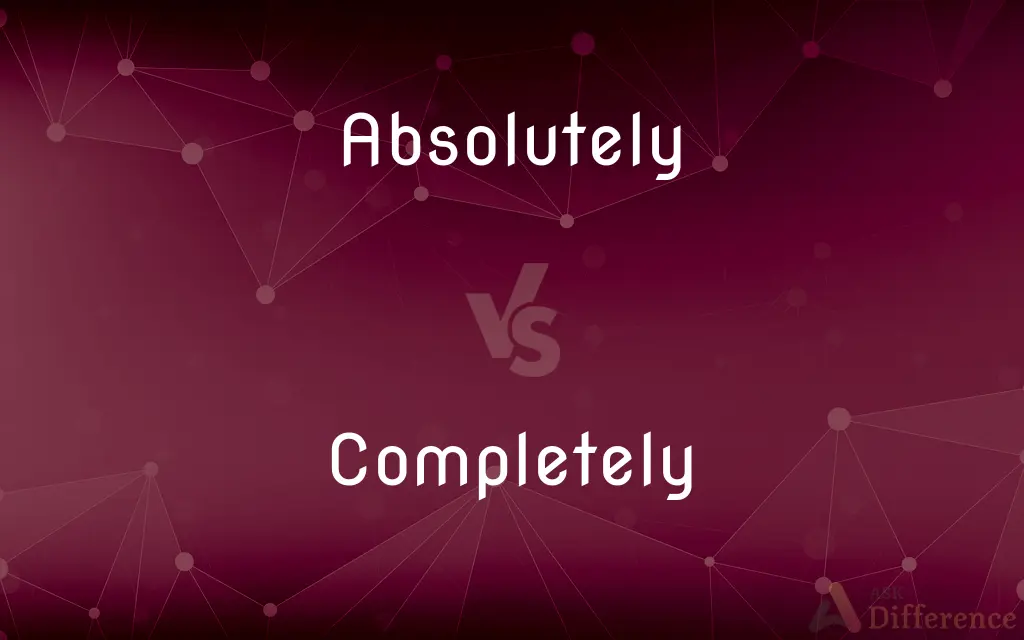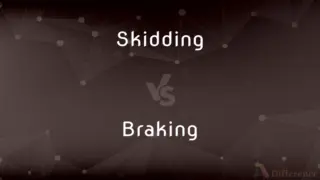Absolutely vs. Completely — What's the Difference?
By Tayyaba Rehman & Maham Liaqat — Updated on March 8, 2024
Absolutely and completely both denote totality, but absolutely often implies perfection or unquestionability, while completely suggests thoroughness or entirety without focusing on quality.

Difference Between Absolutely and Completely
Table of Contents
ADVERTISEMENT
Key Differences
Absolutely and completely are terms often used interchangeably to express totality or entirety, yet subtle nuances distinguish their applications and connotations. Absolutely often conveys a sense of finality or absolute certainty, emphasizing the unquestionable nature of a statement or condition. On the other hand, completely refers to the extent or degree to which something is done or occurs, focusing on the idea of something being whole, total, or finished. It is frequently used to describe the comprehensive coverage or full extent of an action or state.
Absolutely is commonly used in the context of agreement or to reinforce the truth of a statement. For example, when someone says, "I am absolutely sure," it highlights a degree of certainty and conviction. When someone says, "The room is completely dark," it underscores the thoroughness with which the room lacks light, without necessarily implying any qualitative judgment.
While absolutely can also intensify adjectives and adverbs to suggest perfection or an ultimate degree (e.g., "absolutely perfect," "absolutely brilliantly"), completely often pairs with verbs to emphasize the thorough completion of an action (e.g., "completely finished," "completely understand"). This distinction highlights how absolutely leans more towards expressing a qualitative state, whereas completely leans towards quantifying the extent of an action or state.
Absolutely can serve to strengthen agreements or assertions, making it a popular choice in persuasive or emphatic language. It has a slightly more formal or serious tone, particularly in contexts where certainty, permission, or prohibition is being discussed. For example, "You are absolutely prohibited from smoking here," conveys a stronger, more authoritative restriction than if completely were used. Completely, meanwhile, excels in contexts where the totality of an action or state's completion is under discussion. It often appears in descriptions of processes, conditions, or transformations, implying that no part has been left unaffected or incomplete. The choice between absolutely and completely can subtly influence the listener's or reader's perception of the speaker's intent or the situation's gravity.
Comparison Chart
Connotation
Implies certainty, perfection, or agreement.
Suggests thoroughness, entirety, or completion.
ADVERTISEMENT
Common Uses
To emphasize truth, certainty, or agreement.
To describe the full extent or completion of something.
Example Context
"I am absolutely sure."
"The room is completely dark."
Intensity or Quality
Often used to intensify adjectives or adverbs.
Often used with verbs to describe actions or states.
Formality and Seriousness
Slightly more formal or serious, especially in agreements or prohibitions.
Used in a wide range of contexts without a specific lean towards formality.
Compare with Definitions
Absolutely
Used to agree completely.
Do you think it will work? Absolutely!
Completely
With nothing missing or left out.
He was completely overwhelmed by the news.
Absolutely
Fully certain or sure; without doubt.
She was absolutely convinced of his innocence.
Completely
To a complete degree or in every respect.
I completely forgot about the meeting.
Absolutely
Used for emphasis in statements.
That is absolutely correct.
Completely
Without any reservation or exception.
I completely agree with your point.
Absolutely
With no qualification, restriction, or limitation.
The trust was absolutely vested in her.
Completely
Indicating the conclusion of an action or process.
Her attitude has completely changed.
Absolutely
To the greatest extent; completely.
The view was absolutely stunning.
Completely
To the full extent; totally; entirely.
The project was completely finished on time.
Absolutely
Without qualification or restriction; completely
The substance was absolutely pure.
Completely
Having all necessary or normal parts, components, or steps; entire
A complete medical history.
A complete set of dishes.
Absolutely
Used as an intensive
I absolutely love that restaurant. That's absolutely ridiculous.
Completely
(Botany) Having all principal parts, namely, the sepals, petals, stamens, and pistil or pistils. Used of a flower.
Absolutely
As you say. Used to indicate agreement.
Completely
Having come to an end; concluded
The renovation of the kitchen is complete.
Absolutely
In a manner that does not take an object.
Completely
Absolute; thorough
Complete control.
A complete mystery.
Absolutely
In an absolute relationship.
Completely
Accomplished; consummate
A complete musician.
Absolutely
In an absolute or unconditional manner; utterly, positively, wholly.
Completely
(Football) Caught in bounds by a receiver
A complete pass.
Absolutely
Independently; viewed without relation to other things or factors.
Completely
To bring to a finish or an end
She has completed her studies.
Absolutely
(grammar) In a manner that does not take an object.
Completely
To make whole, with all necessary elements or parts
A second child would complete their family. Fill in the blanks to complete the form.
Absolutely
Yes; certainly; expression indicating strong agreement.
Completely
(Football) To throw (a forward pass) that is caught in bounds by a receiver.
Absolutely
In an absolute, independent, or unconditional manner; wholly; positively.
Completely
(manner) In a complete manner
Please completely fill in the box for your answer, using a number 2 pencil.
Absolutely
Completely and without qualification; used informally as intensifiers;
An absolutely magnificent painting
A perfectly idiotic idea
You're perfectly right
Utterly miserable
You can be dead sure of my innocence
Was dead tired
Dead right
Completely
(degree) To the fullest extent or degree; totally.
He is completely mad.
Absolutely
Totally and definitely; without question;
We are absolutely opposed to the idea
He forced himself to lie absolutely still
Iron is absolutely necessary
Completely
In a complete manner; fully.
Completely
To a complete degree or to the full or entire extent (`whole' is often used informally for `wholly');
He was wholly convinced
Entirely satisfied with the meal
It was completely different from what we expected
Was completely at fault
A totally new situation
The directions were all wrong
It was not altogether her fault
An altogether new approach
A whole new idea
Completely
So as to be complete; with everything necessary;
He had filled out the form completely
The apartment was completely furnished
Common Curiosities
Does "completely" focus more on the process or the outcome?
It tends to focus more on the outcome, highlighting the extent or completeness of the result.
Can "absolutely" and "completely" be used interchangeably?
In many contexts, yes, but the choice can affect the nuance of certainty vs. thoroughness.
Is "absolutely" more formal than "completely"?
Slightly, especially in contexts of agreement or emphasis on truth and certainty.
Is "absolutely" only used for positive statements?
No, it can be used to emphasize any statement, whether positive, negative, or neutral.
Can "absolutely" be used in legal contexts?
Yes, it's often used to denote unconditional terms or to stress the definitiveness of statements.
How do "absolutely" and "completely" differ in emphasis when used with adjectives?
"Absolutely" emphasizes the certainty or perfection of the adjective, whereas "completely" focuses on the extent or totality.
Can "completely" imply a change of state?
Yes, it often describes a transition to a thorough or full extent, indicating a complete change or finish.
In what contexts is "absolutely" preferred over "completely"?
When emphasizing certainty, agreement, or an ultimate degree of quality.
Is "completely" suitable for describing emotions?
Yes, it can describe the depth or entirety of emotional experiences.
Does "completely" suggest anything about quality?
No, it primarily focuses on the extent or totality rather than the quality.
How does "completely" enhance the meaning of verbs?
It underscores the thorough completion or total effect of an action.
Can "absolutely" intensify any adjective or adverb?
While it commonly intensifies, its use is more effective with words related to quality, certainty, or degree.
Is "completely" ever used in exaggerations?
Yes, it can be used to exaggerate the extent to which something is done or felt.
Can "completely" be used in negative contexts?
Yes, it can describe something being entirely lacking or absent, such as "completely useless."
Can "absolutely" be used to respond to questions?
Yes, it's a strong affirmative response, indicating total agreement or confirmation.
Share Your Discovery

Previous Comparison
Counter vs. Desk
Next Comparison
Skidding vs. BrakingAuthor Spotlight
Written by
Tayyaba RehmanTayyaba Rehman is a distinguished writer, currently serving as a primary contributor to askdifference.com. As a researcher in semantics and etymology, Tayyaba's passion for the complexity of languages and their distinctions has found a perfect home on the platform. Tayyaba delves into the intricacies of language, distinguishing between commonly confused words and phrases, thereby providing clarity for readers worldwide.
Co-written by
Maham Liaqat















































